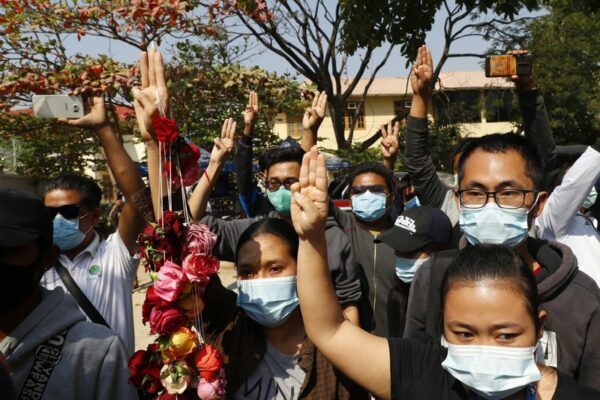
Myanmar’s internet has been shut down as thousands of people joined the largest rally yet against February 1 coup.
A near-total internet blackout is in effect with connectivity falling to 16% of ordinary levels, said the monitoring group NetBlocks Internet Observatory.
In Yangon, Myanmar’s biggest city, crowds chanted “Military dictator, fail, fail; Democracy, win, win”.
Police with riot shields have blocked the main roads into the city center.
The internet shutdown happened hours after the military blocked access to Twitter and Instagram to stop people mobilizing for protests. Facebook had been banned a day earlier.
Many users had evaded the restrictions on social media by using virtual private networks (VPNs) but the more general blackout severely disrupted that.
Civil society organizations urged internet providers and mobile networks to challenge the blackout order, Reuters reported.
Human rights group Amnesty International called the shutdown “heinous and reckless” and warned it could put the people of Myanmar at risk of human rights violations.
The military has not commented. It temporarily blocked access to the internet following the coup.
On February 6, protesters – including factory workers and young students – called for the release of those detained by the army, including elected leader Aung San Suu Kyi.
They marched through the streets of Yangon as city buses sounded their horns in support.
Bystanders flashed the three-finger Hunger Games salute, which has become a symbol of defiance against authoritarianism, while residents clapped or banged pots and pans on their doorsteps.
Police with riot shields used barbed wire to block roads and water cannon were put in place in some areas as a precaution, but the demonstration reportedly remained peaceful, with no attempt by protesters to pass police lines.
Myanmar Coup: Aung San Suu Kyi Charged with Breaching Import-Export Laws and Others
Myanmar Military Coup After Aung San Suu Kyi and Leaders Detained
Demonstrators gave police roses and bottles of drinking water, calling on them to support the people not the new regime.
Another demonstration took place in Myanmar’s second city, Mandalay.
Myanmar – also known as Burma – has remained mostly calm in the aftermath of the coup, and there were no immediate reports of violence after Saturday’s protests. More demonstrations were expected to be held later.
The military authorities are hunkered down in the capital, Nay Pyi Daw, and have so far avoided direct engagement with the protesters.
Aung San Suu Kyi is under house arrest, according to her lawyer. Police documents show she is accused of illegally importing and using communications equipment – walkie-talkies – at her home in the capital.
The coup took place as a new session of parliament was set to open, following November’s landslide election win by the NLD party.
Many Burmese watched the events unfold in real time on Facebook, which is the country’s primary source of information and news. But three days later, internet providers were ordered to block the platform for stability reasons.
Following the ban, thousands of users were active on Twitter and Instagram using hashtags to express their opposition to the takeover. By 22:00 local time on February 5 access to those platforms had also been denied.
There was no official word from the coup leaders but AFP reported it had seen an unverified ministry document that said the two social media sites were being used to “cause misunderstanding among the public”.
